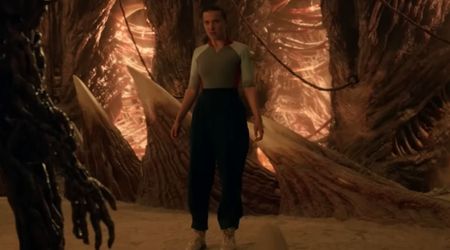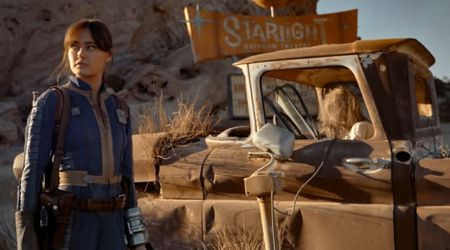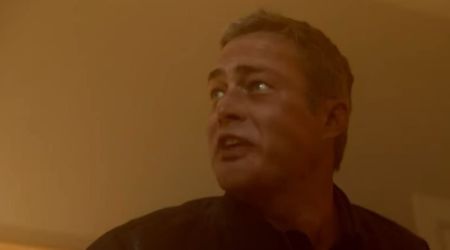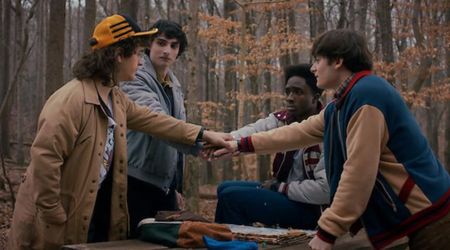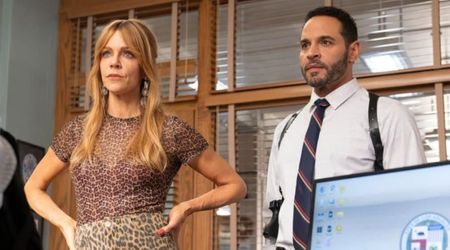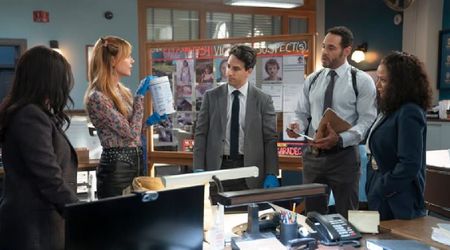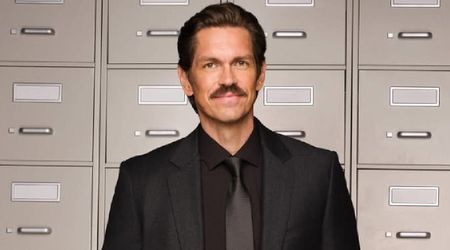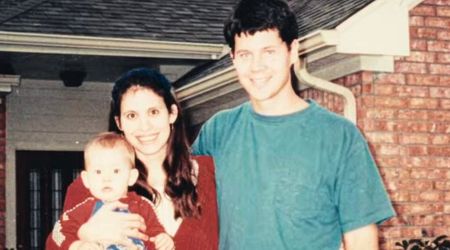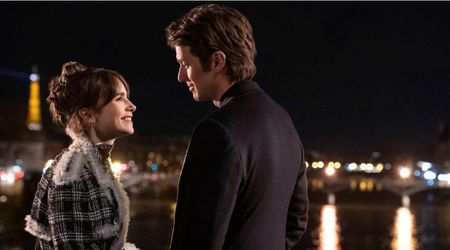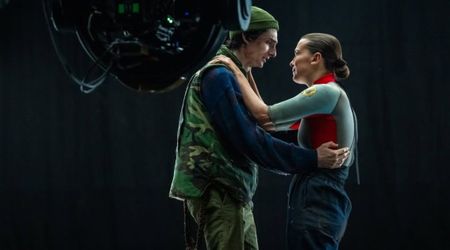'Yellowstone' review: Breathtaking visuals let down by subpar premise

The series premiere of Paramount's 'Yellowstone,' starring Kevin Costner and created by the Oscar-nominated writer/executive producer Taylor Sheridan, averaged 2.8 million viewers in live+same day to become the most-watched original scripted series ever on the network. The show's average premiere audience more than doubled their first scripted drama series, 'Waco,' and more than tripled the debut viewership of comedy 'American Woman.'
Considering the considerable star power of Oscar-winner Costner and the host of talented supporting cast that the show boasts, as well as the writing and directing prowess of Sheridan, who is acclaimed for penning the screenplays of the likes of 'Sicario,' 'Hell or High Water,' and 'Wind River,' one would expect 'Yellowstone' to kick it out of the park in terms of its premise, subplots, characters, and narration. But despite boasting of some promising elements, the series fails to live up to its initial hype.

Sheridan's reputation for mapping out the sociopolitical climate of America's southern states and capturing the intricacies involved in the conflicts that have plagued the region since the country's foundation is second to none. With 'Yellowstone,' he attempts to reproduce the nation's oldest, bloodiest, most controversial, as well as most current and relevant conflict — the battle between tradition and progress — and does so with varying degrees of success.
The series opens with John Dutton (Kevin Costner) caught in a roadside collision and talking in soothing tones to a mare ensnared underneath one of the wagons. In typical cowboy fashion — and a trope we've seen in tens of movies and TV shows that incorporate the western element — he mercy kills it, setting the tone for the rest of the first three episodes that seem to consistently and unfortunately adhere to poorly thought out and cliched sequences.
But what is almost immediately noticeable is the stunning gorgeous backdrop where the story unfolds. Shot at the Chief Joseph Ranch in Darby, Montana — which serves as Dutton's Yellowstone Ranch — as well as its surrounding regions, the breathtaking visuals of the region's rolling hills and winding roads invoke this primal urge to want to stop everything you're doing, reach out, and jump in.
It would be unfair to describe it as anything less than a visual orgasm and it was undoubtedly my favorite aspect of the show. The fact that these enchanting landscapes were a part and parcel of every episode was the icing on the cake. The best compliment I can give cinematographer Ben Richardson is that if the state of Montana used stills from 'Yellowstone' instead of whatever it currently uses for its tourism commercials, they would get a lot, lot many more visitors.
However, its the premise of the show where it arguably falls flat on its face. There was so much potential and so many possibilities when it came to exploring the centuries-old conflict between the Indians and the settlers, but 'Yellowstone' and Sheridan, decide to go down the beaten path.
Right off the bat, the viewer knows that, in whatever twisted fashion, the show is about family. The Dutton family to be exact. They own the largest contiguous ranch in the country, and with that currency of the invaluable land, comes power. Power to control the locality, the people, the law enforcement, the politicians, everything. But everyone wants to encroach their borders — land developers, America's first National Park, the Indian reservation — and they need to deal with it by setting aside their petty differences.
The crux of 'Yellowstone,' however, is the battle between the stoic, macho, emotionless mustachioed Dutton, the typical patriarch, who faces off against Thomas Rainwater (Gil Birmingham) the Indian, who despite never experiencing the conflict that plagues so many of his people, is on a righteous crusade to right the wrongs and take revenge in his oppressed people's stead.
There's a problem that's apparent with that plot, and it's one that Dutton points out in the third episode. When it comes to these types of altercations and face-offs, one character is always the underdog that you want to root for to win; the one that has steeled his resolve in the face of insurmountable challenges to overcome the odds and finally find himself on equal footing to take on his adversary. But Rainwater is not that underdog, not by any stretch of the word.
Rainwater's character is, to put it lightly, a pompous, sanctimonious a***hole. The first time we see him, he's taking over a casino and meeting with the state governor to engineer a plot to screw over Dutton. The 'plan' turns out to be to refuse to give back cattle that have strayed on to reservation land; weak and doomed to fail from the beginning.
Instead of coming across as the loveable underdog, he comes off as quite the opposite — as this person who feels like the world owes him something by virtue of nothing more than his bloodline. College educated and once a corporate shill, his misguided and haphazard lust for vengeance make you want to cheer for Dutton instead.

Why he's on his quest for vendetta is equally unclear. Yes, his people are historical rivals with Dutton, who according to the show, owns a ranch larger than the size of Rhode Island, but it seems that their rivalry is unnecessarily contrived and forced. But then again, critics were given just three episodes to review, so it is possible that we learn more about the history of their bad blood.
Compared to Sheridan's previous attempts at writing, where he manages to bring out the essence and beauty of these unique characters driven by complex emotions and aspirations, those in 'Yellowstone' feel painfully one-dimensional. And the problems don't just end with Dutton or Rainwater.
While Jamie Dutton (Wes Bentley), Kayce Dutton (Luke Grimes) have relatively minor flaws, the biggest culprit is undoubtedly Beth Dutton (Kelly Reilly) who embodies every overused trope in the book. As the only significant female character in the show (sorry Michaela Conlin), one would expect a little more poise in how she was written. Instead, she has a typical sob backstory — she inadvertently caused her mother's dead — which infests itself in a hyper-aggro personality wherein she has to vilify every person close to her, emasculate every man she ever meets, and always, always get the last word. Overcompensating in every sense of the word.
Another noticeably irksome facet of the writing is how everyone in the show seems to have these all-encompassing, hard-hitting hyperbolic one-liners that seem to perfectly sum up every situation. When it's used to make a point, it has the desired effect, but when these lines find themselves in entirely inconsequential situations, they lose their sheen. Case in point: Dan Jenkins (Danny Huston), a real estate developer who wants to build a resort in town, while in conversation with a visitor, uses the phrase 'monuments of an exhausted landscape' to describe the town's resistance against modernization.
What is appreciable about 'Yellowstone' though, is how well it infuses the good with the bad, and the ugly. Every poignant moment — be it the brothers fishing down the stream, the horses barreling down the ranch, the beauty, and rawness of calf-birth, the red-hot iron sizzling naked skin with the brand that marks brotherhood — is undercut by the rattlesnakes, the meth lab explosions, the kidnappings, and the wolf getting run over; a reminder that tragedy always lurks just around the corner.
A special shout out to Jimmy Hurdstrom (Jefferson White), the gaunt-faced drug addict has-been with no future who's given a shot at being a cowboy after his grandfather begs Dutton to take him under his wing. In a show that's so full of characters you can't help but dislike and develop a distaste for, Jimmy provides a refreshing contrast. You genuinely want to see him overcome his depressing past and succeed.
'Yellowstone' does leave you with a lasting impression: one of 'What could have been?'
Creators: John Linson, Taylor Sheridan
Stars: Kevin Costner, Kelly Reilly, Cole Hauser

